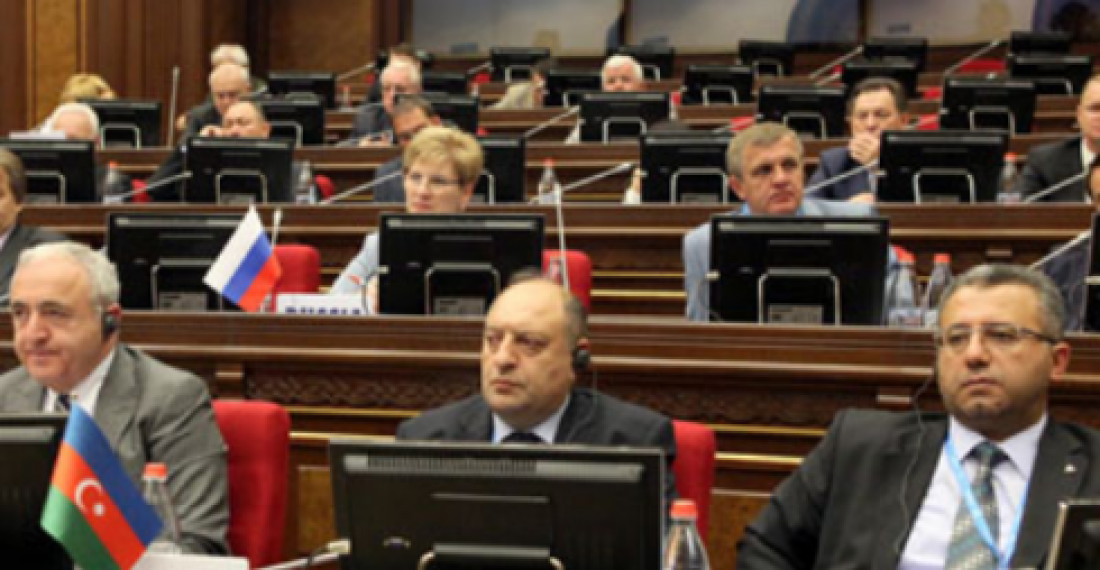Число обменов с участием представителей парламентов Армении и Азербайджана, посетивших столицы этих двух стран, резко возросло за последние несколько месяцев. Ряд парламентских структур, таких как Евронест Европейского парламента недавно провели встречи в Баку и в Ереване, на которых присутствовали парламентарии обеих стран. Эти обмены рассматриваются, как положительный фактор, которые способствуют открытию процесса диалога между политическими элитами двух стран.
Этот процесс, однако, проходит не без трудностей.
39-я пленарная сессия Парламентской Ассамблеи Черноморского экономического сотрудничества состоялась в Ереване на прошлой неделе, несколько ушедшая в тень фестиваля Евровидение и событий, происходивших вокруг него в Баку.
В своем приветственном слове Президент Серж Саргсян выразил надежду, что организация будет работать в направлении открытия границ в регионе. Однако азербайджанская делегация отметила, что открытие границ и дальнейшее сотрудничество с Арменией возможно только, если азербайджанские земли, оккупированные Арменией, будут возвращены, и карабахский вопрос будет решен в рамках территориальной целостности Азербайджана. Депутат парламента Азербайджана, Асеф Гаджиев, назвал место непостоянного члена Азербайджане в Совете Безопасности ООН в качестве доказательства международной поддержки политики своей страны.
В средствах массовой информации разгорелась полемика по поводу того, что азербайджанские парламентарии посетили Мемориал жертв Геноцида армян и Музей Цицернакаберд, недалеко от Еревана.
Азербайджанские СМИ утверждают, что их армянских коллеги неверно сообщили о посещении азербайджанскими депутатами этих мест, в то время как некоторые армянские СМИ отреагировали, обвинив азербайджанские онлайн издания в нападениях на своих же депутатов.
Парламент Азербайджана официально опроверг участие своих членов в этом, заявив, что во время этого визита они находились в Грузии. Так же, как и близкий союзник Турции, Азербайджан разделяет его мнение, что гибель армян в Османской империи в 1915 произошла в контексте войны.
Остальная часть мероприятия ПАЧЭС прошла в основном без осложнений. На пленарном заседании приняли участие около 70 парламентских делегаций из 10 стран. По случаю 20-летия организации, делегаты единогласно приняли заявление, вновь декларируя своей целью развитие "добрососедства, дружбы и сотрудничества между странами региона, [и] взаимовыгодного сотрудничества в политической, экономической и гуманитарной сферах". Представитель России, Евгений Капышин, был избран в качестве следующего генерального секретаря, и кроме этого Межпарламентской Ассамблеи Православия (МАП) и Парламентскому Союзу Организации Исламская Конференция были предоставлены статусы наблюдателя.
Армения, которая председательствовала в Ассамблее в течение последних шести месяцев, уступило место Азербайджану - следующая сессия пленарного заседания состоится в ноябре, в Баку.
Источник: commonspace.eu
Фото: Парламентская делегация Азербайджана на мероприятии ПАЧЭС в Ереване
Commentary
Парламентская дипломатия продолжается, несмотря на проблемы. Армяно-азербайджанские парламентские обмены становятся регулярными.







